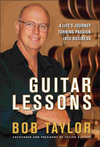
Guitar Lessons: A Life's Journey Turning Passion into Business
| List Price: | US $24.95 |
| Government Price: | US $12.72 |
Publicity Contact
- Publicist 1: Heather Condon
- Title: Publicist
- Email: [email protected]
- Phone: (201) 748-6017
Q&A with Bob Taylor, author of
GUITAR LESSONS: A Life's Journey Turning Passion into Business
What inspired you to write this book?
The opportunity was presented to me, and the time just seemed right. Sometimes, I think, if you do these things too early it’s a waste of time. In our case, it seems as if everything is right for people to want to read the book.
How would you describe Guitar Lessons to someone who has little knowledge of Taylor?
It’s a book of business lessons learned through experience and told in story form. It’s the story of starting a business as a teenager based on a craft I fell in love with, and really, how it turned into a major business by bringing great people in with me and persevering through the years.
Is there content in the book that will surprise existing Taylor owners?
I think people familiar with the company will see it as a more in-depth and candid story than what they are going to read in a blog, article or company profile. In a book format, there’s enough time to go into depth. There are lots of Taylor guitar owners. If we’ve sold a million guitars and 750,000 of those have only recently joined our customer base in the last six or seven years, this will give them a better insight into our story and where we came from.
Which part of the book was the most challenging to write and why?
The early years were really easy to write — it’s like a very narrow street. When the company was small, it was easy to reflect from my perspective. What was challenging was to write from my perspective as a group story because, as Taylor Guitars grew, I didn’t take the liberty to tell what other people were thinking or feeling. I just had to skip to the part I know, and that was a little challenging.
What lessons do you want readers to leave with?
The main lessons are that it takes perseverance and the ability to knock down obstacles as you go. There’s no singular thing that acts as a turning point in a business and gets you to finally “make it.” There may be 25 things that you need to solve for your business to be successful. Maybe you have to get to where eight or nine are solved just to stay in business, and then you go from there. But you must continue to own something, whether it means learning how to do production, marketing your products, or taking care of employees. You can run a car with six pistons, but it takes all eight pistons to fire for the car to really run great.
In the book, you cite a unique value proposition that Taylor Guitars has learned as a company: that you must make products and get them out there even if the market isn’t ready to buy. How has embracing this risk created opportunity for you?
To me, there’s no opportunity without risk. One opportunity is the ability to do a better job just by merging with everyone else, but really, how are you going to do a better job? It requires risk: to give up profit potential, spend money, take longer, be more dedicated, and turn things around more quickly. In the realm of products, the designer has a place in the ecosystem, and it’s to design. Then you have to let consumers take that and do what they will with it. If you design really good things, consumers will find ways to use them. Maybe not right off the bat, but eventually they come around. To me, the risk always seems very low. How much do you really risk? Other than the early years, I can’t remember “risking it all,” but back then I had nothing to lose. Now Taylor risks diluting our resources, brand, attention on a new product — but that’s still a low risk. Any smart business person isn’t going to roll the dice on their entire company to put something out. I think that the more you put new things out, the more people are used to you putting new things out, and the less risky it becomes.
What advice can you give to readers who want to pursue their passion but fear having a lack of financial stability?
Start young — don’t put it off. You don’t need financial stability when you are young. Don’t waste your life waiting to do it; it only gets harder. If it’s too late for that approach, you’ve got to work two jobs. You’ve got to figure out how to make things happen while you don’t give up your financial stability. Stay out of debt and let your life get very meager. The fruits of that could be wonderful if you can triumph and turn it into a business. As I say in the book, it’s either “pay now and play later” or “play now and pay later.” But sooner or later you are going to pay.





